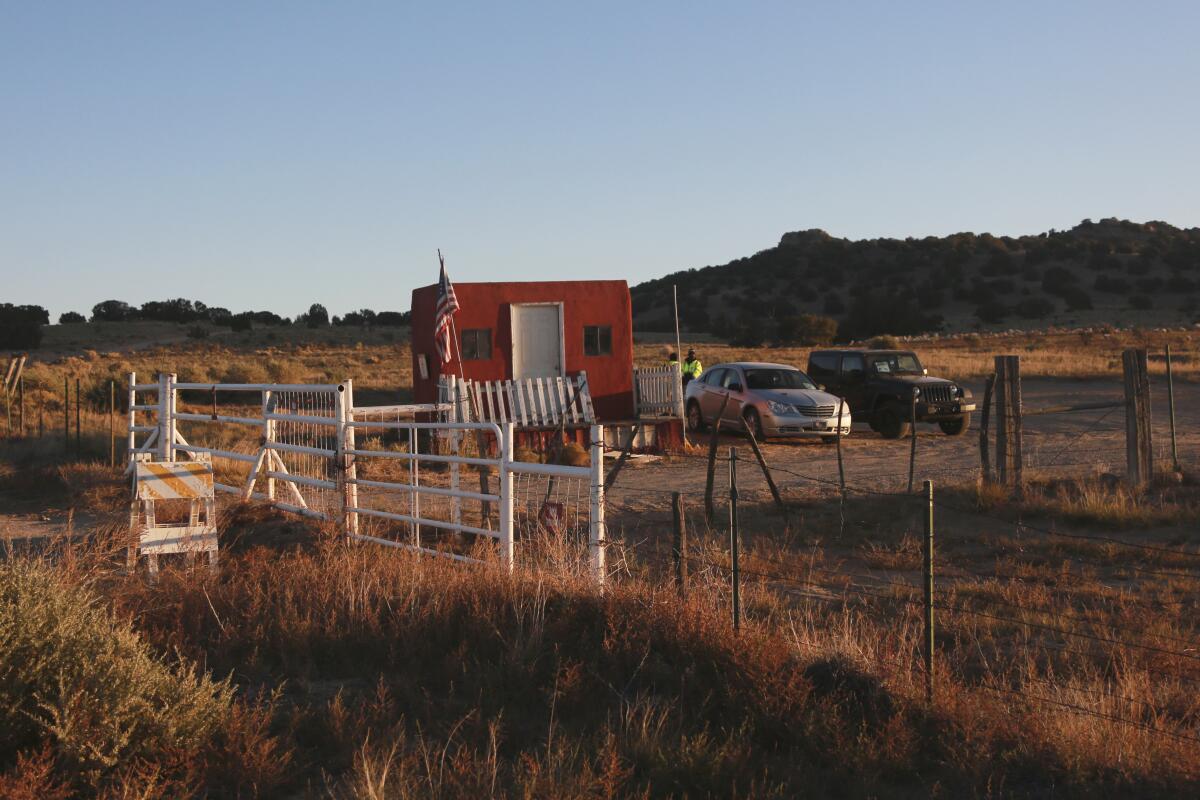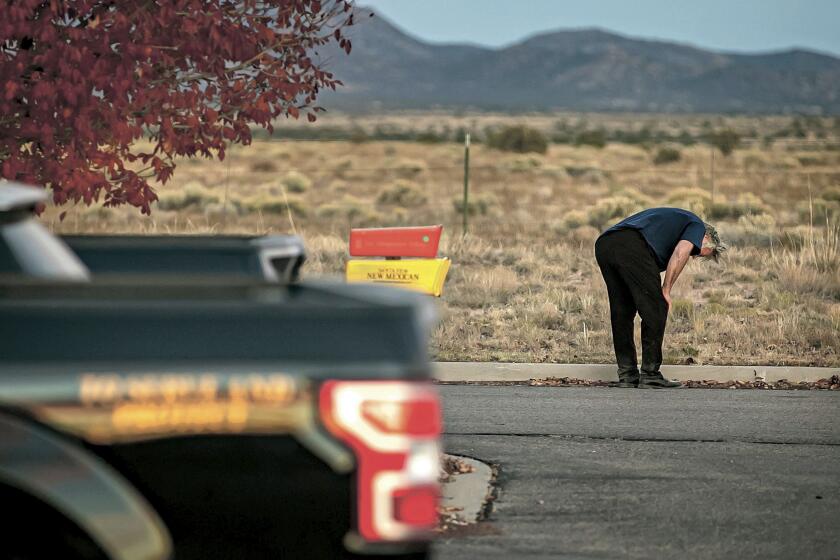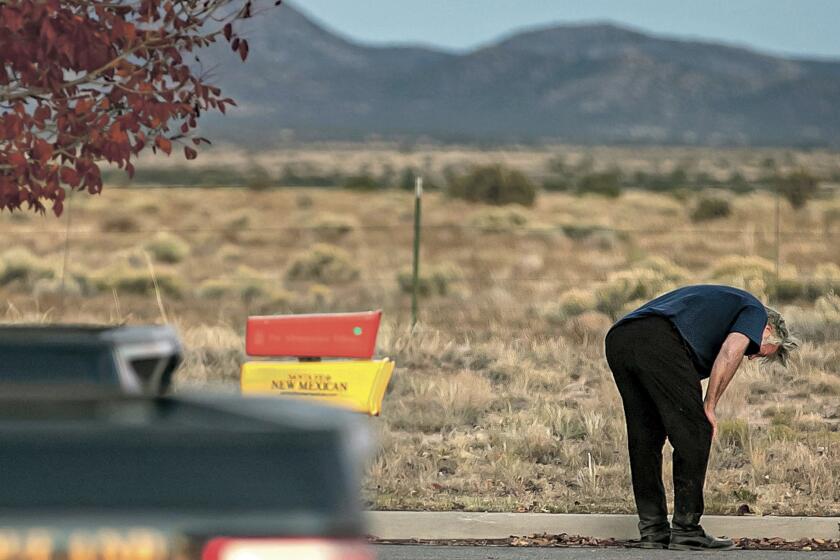After ‘Rust’ shooting, attention turns to Georgia producers

- Share via
DECATUR, Ga. — When makeup and hair assistant Katelyn Bushong arrived on the Smyrna, Ga., set of the thriller “By Night’s End” in March 2019, all she was expecting was a $125 paycheck for 12 hours of work.
Bushong applied fake blood to actors to make them appear beat up and was reassured by a producer with 3rd Shift Media, a local production services company, that she would get paid after the shoot wrapped.
But Bushong and two other crew members who worked on the low-budget film told The Times they weren’t paid for their services.
“I don’t think you’d want to go to your job and not get paid two years later,” said Bushong, 25, who lives in the Atlanta area.
Though “By Night’s End” was a tiny project by Hollywood standards, it was a big deal for 3rd Shift Media, a company launched in 2016 by Decatur, Ga.-based producer Ryan Dennett-Smith, according to Georgia business records.
The film was prominently featured on a local news broadcast about how filmmakers wanted to create a more sustainable entertainment industry in Georgia by making homegrown productions.
But recently, Dennett-Smith’s company has faced scrutiny for its role in the production of the movie “Rust” in New Mexico, after cinematographer Halyna Hutchins was fatally shot by a weapon held by actor and producer Alec Baldwin while rehearsing a scene.
Dennett-Smith, chief executive of 3rd Shift Media, was the supervising unit production manager on “Rust.” The film’s line producer, Gabrielle Pickle, and unit production manager, Katherine “Row” Walters, also work for 3rd Shift Media, according to the company’s website.

While producers on independent films can have a wide range of responsibilities, including financing, line producers and unit production managers oversee the day-to-day aspects of filmmaking. Producers hire production services companies to ensure that projects come in on time and on budget.
Interviews with crew members from “Rust” and documents reviewed by the Times paint a picture of a troubled set plagued by labor tensions before the shooting. Crew members said they raised concerns over issues such as gun safety, payment and lodging.
“In my 10 years as a camera assistant, I’ve never worked on a show that cares so little for the safety of its crew,” A-camera first assistant Lane Luper wrote in an Oct. 20 email to Walters the night before the shooting.
The Santa Fe County Sheriff’s Office is conducting an investigation into how Hutchins died. Prior to the fatal shooting, Assistant Director David Halls yelled “cold gun” and told a sheriff’s detective that he was not aware that the gun had live rounds in it, according to affidavits filed by the sheriff’s office. One of the affidavits said Halls took a prop gun set up by the armorer on a cart and handed the gun to Baldwin, a claim Halls’ attorney has denied.
“Rust,” a western involving period sets and firearms, was supposed to cost about $7 million to make and was to shoot over 21 days, an ambitious time frame for a period piece, film experts have said.
A representative for 3rd Shift Media, Alex Dudley, declined to comment. Pickle, Dennett-Smith and Walters did not respond to requests for comment.
No one answered the door last week at 3rd Shift Media’s office — a tiny, brick ranch-style home in a rundown neighborhood of Decatur. Posted in the windows next to the front door were several yellow movie-shoot location signs — “ACTD2,” “SUMMER 03” and HECK YEAH” — plus a promotional poster for a local brewery: “Weekends are overrated!”
Interviews with multiple members of the “Rust” crew paint an hour- by-hour picture of a cascade of bad decisions that created a chaotic set on which a lead bullet was put into a prop gun.
“The safety of our cast and crew is the top priority of Rust Productions and everyone associated with the company,“ Rust Movie Productions said in a statement the day after Hutchins’ death. “Though we were not made aware of any official complaints concerning weapon or prop safety on set, we will be conducting an internal review of our procedures while production is shut down.”
Dennett-Smith had spent years working in Georgia’s scrappy independent filmmaker community. As Hollywood was bringing more large-scale productions into the state to tap lucrative film tax credits, Dennett-Smith wanted to build a film company that was native to Georgia.
Both he and Pickle were involved with the local filmmaker community through nonprofit groups such as the Atlanta Film Society and Georgia Production Partnership. In 2018, they helped lead a push to get local film workers and transplants registered to vote, in part to preserve the state’s production incentive program, according to interviews they did with Atlanta CBS station WGCL-TV.
“They came up within that community before productions were bringing everybody in,” said a producer who worked with Dennett-Smith who asked not to be identified for fear of reprisals. “When I met them, they were very big about wanting to produce quality content and were always very vocal about being safe and working hand in hand with the unions.”
Dennett-Smith started off working in music after high school but transitioned to the film industry after several years. He worked jobs in unscripted and reality TV shows, including Animal Planet’s “Lone Star Law” and “North Woods Law.” Last year, he served as one of the production managers on the Netflix reality dating show “Love Is Blind.”
After he launched 3rd Shift Media, Dennett-Smith described it in a local press interview as a “turnkey” production company for commercials and independent films that would manage 20 to 40 projects a year.
“Our company is set up to have a project brought to us and open up the doors to successfully turn out the project,” he told Voyage ATL in December 2019.
3rd Shift has worked on commercials, trailers and short films and had begun to move more into feature films.
Dennett-Smith, Pickle and Walters worked on the action film “Supercell,” another project starring Alec Baldwin that was produced by Thomasville Pictures and filmed in Montana and Georgia. The owners of Thomasville Pictures, Ryan Donnell Smith and Allen Cheney, are credited as producer and executive producer, respectively, on “Rust.”
Safety questions had been raised about another film involving two of the producers.
According to IMDb, “By Night’s End” is the first feature-length film that credits 3rd Shift Media as the production company.
In an online panel discussion on indie filmmaking posted on YouTube, Dennett-Smith talked about the challenges of making movies with scant resources, recalling how he cooked breakfast for the crew every morning on “By Night’s End.”
“Indie film’s a hustle,” he said in the video. “It’s all about figuring out how scrappy you can get ... what you can borrow from your friends, family. How much money can you pull together to do stuff.”
Bushong, who had previously worked on various film shorts, expected to be paid after the 12-day shoot was completed.
A crew member agreement viewed by The Times said compensation would be deferred until the film was sold, an arrangement that is common for microbudget independent movies like “By Night’s End.”
In November 2020, Dennett-Smith sent an email to some crew members who were awaiting paychecks, informing them that the film had been sold — it’s available through services including Amazon, YouTube and Tubi — but that payments would be deferred at least until the middle or fourth quarter of this year.
However, Bushong and two other crew members who asked not to be identified for fear of reprisals said they still had not been paid.
In the death of Halyna Hutchins, some film workers see the tragic result of a troubling trend in how producers of low-budget films place financial considerations over human ones.
“I had no idea who to reach out to because I was nonunion, and they said we would be paid after production,” Bushong said.
The economics of indie filmmaking have become increasingly challenging for producers. The theatrical market for indies has largely disappeared. The insatiable demand for content from streaming services has led to a surge in production. Producers are responding by trying to make movies faster and cheaper.
“The model is broken,” said Alex Ferrari, an Austin-based director who hosts the podcast Indie Film Hustle and is not connected to “Rust.” “There is stronger and stronger pressure on these film productions to cut corners, make it for lower costs.”
On “Rust,” many crew members described a rushed mentality on the set.
Jonas Huerta, a digital utility technician, said he raised concerns about production issues, including safety. He sent a email detailing his concerns to Walters the night before Hutchins’ death.
“I also feel anxious on set, I’ve seen firsthand our [assistant director] rush to get shots and he skips over important protocols,” Huerta wrote in his email, The Times reported Oct. 31.
The next morning, when the camera crew was packing up to leave the set, Pickle ordered them “to work faster,” Huerta said. She pointed at Luper, the A-camera first assistant, and said: “You need to get off the property immediately, or I will call security,” Luper recalled in an interview.
Pickle had faced a labor dispute on another production. In October 2018, while serving as a line producer on “Keys to the City,” Pickle “interrogated employees about signing union authorization cards,” according to a settlement agreement between IATSE and the Georgia-based production company, Tier 2 Films.
According to the document, first reported by the Hollywood Reporter, the production company fired several employees, including camera crew, because of union activities. IATSE, which brought the complaint to the National Labor Relations Board, accused Pickle of calling and texting employees about their unionization activities. The production company also called police to remove union representatives, the union said. Tier 2 Films settled in 2019 and agreed to pay back wages to seven workers.
Times staff writers Meg James, Amy Kaufman and Julia Wick contributed to this report.
More to Read
Inside the business of entertainment
The Wide Shot brings you news, analysis and insights on everything from streaming wars to production — and what it all means for the future.
You may occasionally receive promotional content from the Los Angeles Times.
















